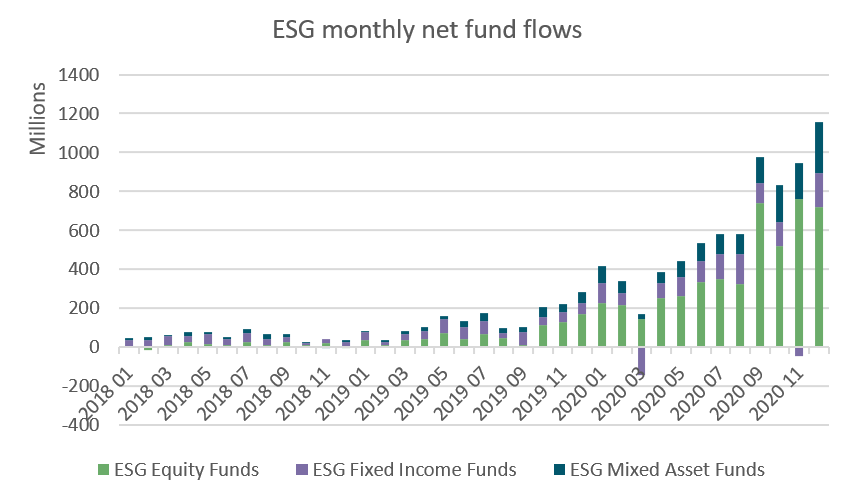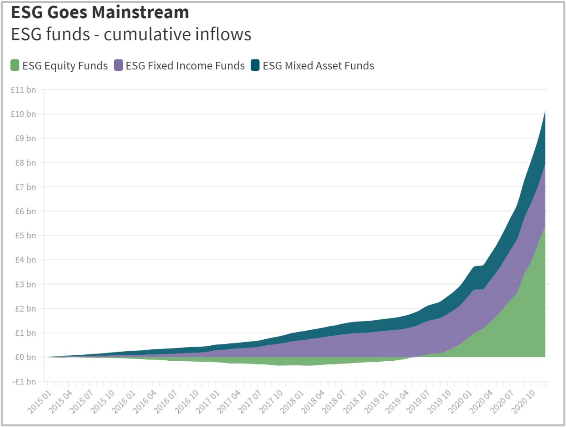Inflows to equity funds surged to £2.4bn in December, according to the latest Fund Flow Index from Calastone, the largest global funds network. This was the second-best month on record and took the Q4 total to £4.6bn, its highest since mid-2015. For the whole of 2020, equity inflows were £7.5bn, almost four times as great as in 2019.
Active funds see dramatic turnaround – best inflows in five years
The most surprising feature of 2020 was the sudden Q4 turnaround in the fortunes of active equity funds. Investors have withdrawn cash from active funds in two out of every three months in the last three years, but this changed suddenly at the end of 2020. November and December saw huge inflows totalling £1.5bn and £1.7bn respectively. December alone was the best month for active equity fund flows since July 2015. ESG strategies accounted for half of the new capital flowing into active equity funds in November and December, but active global, North American and European funds made up the rest. Index funds, now the bedrock of longer-term equity investment by UK savers, sold strongly all year, with inflows totalling £8.1bn. £19.7bn has flowed into passive funds in the last three years, while active funds have shed over £2bn of capital, the strong end to 2020 notwithstanding.
Index funds, now the bedrock of longer-term equity investment by UK savers, sold strongly all year, with inflows totalling £8.1bn. £19.7bn has flowed into passive funds in the last three years, while active funds have shed over £2bn of capital, the strong end to 2020 notwithstanding.
Record inflows to European equities after years of outflows
European equity funds had been firmly out of investor favour until the middle of 2020. For almost two years, they suffered outflows every month until August 2020 when the tide began to turn. Since then, £870m has flowed in, more than half of it in December. The £487m that flowed into European funds in December was the best ever month for this category, and particularly benefited active European equity funds.Funds focused on UK equities shunned by investors, though December saw negativity moderate a touch
Funds focused on UK equities had a tough year in 2020. Despite accounting for £1 in every £4 of equity funds by value, those with a UK focus attracted just £1 in every £64 of cash inflows in 2020, equivalent to just £116m. The inflows all came in the first half of the year. As the negotiations with the EU turned ever sourer, the pandemic prompted the cancellation of the big dividends that support appetite for UK equities, and it became clear how big the Covid hit to the UK economy would be, outflows began. Between June and December, £2.0bn left funds investing in UK equities, while all other geographical categories enjoyed inflows totalling £9.2bn between them. There were positive signs at the very end of the year, however. The UK/EU trade deal was clinched very late in the day but it, and the commencement of the vaccination programme, caused an immediate turnaround in appetite for UK stocks. December outflows overall were the lowest in months - the flow of funds even turned positive in the last five trading days of the year to the tune of £148m.
ESG went mainstream in 2020
The ESG boom continued in December. Investors bought a record £1.1bn of ESG funds in a single month, roughly equivalent to the entire inflow from 2015-2018 combined. Two-thirds of this capital flowed into ESG equity funds. ESG equity funds have enjoyed phenomenal growth all year, but ESG is now taking off in mixed asset funds too. ESG fixed income strategies are selling strongly too, but their flows are more volatile. ESG funds accounted for more than half of all the flows into equity funds in 2020. Nine-tenths of this capital was actively managed.
 Fixed income funds ended 2020 on a high too. Inflows surged to £1.2bn almost double the November total and leaving Q4 with the best inflows since mid-2019. Property funds suffered outflows but at a slowing pace.
Edward Glyn, head of global markets at Calastone said: “The coronacoaster year for equity funds ended on a high as rock-bottom interest rates and the prospect of mass vaccination boosted both stock market valuations and the appetite to hold shares. Markets with high growth characteristics like Asia, emerging markets and the US have benefited most from the uplift in valuations and this is reflected in fund flows too. Those with low growth characteristics and a high yield, like the UK, have been left far behind both in valuation terms and fund flows. The UK’s particular difficulties handling the pandemic and Brexit have only added to investor distaste for UK assets.
The growing optimism that characterised the end of 2020 is reflected in the renewed appetite for active funds. Index funds are cemented into monthly savings plans and are now the default choice for most investors, but at moments of rising spirits and increased risk appetite, active funds benefit disproportionately as investors scour their fund ranges to find the one that meets their needs. A lot of the time that now means adding ESG considerations into the mix – no other single strategy has garnered as much in new capital in 2020 as ESG equity funds. Active fund managers will be overjoyed that ESG is now mainstream and represents an area where they have a real edge over passive funds, at least for the time being.”
Fixed income funds ended 2020 on a high too. Inflows surged to £1.2bn almost double the November total and leaving Q4 with the best inflows since mid-2019. Property funds suffered outflows but at a slowing pace.
Edward Glyn, head of global markets at Calastone said: “The coronacoaster year for equity funds ended on a high as rock-bottom interest rates and the prospect of mass vaccination boosted both stock market valuations and the appetite to hold shares. Markets with high growth characteristics like Asia, emerging markets and the US have benefited most from the uplift in valuations and this is reflected in fund flows too. Those with low growth characteristics and a high yield, like the UK, have been left far behind both in valuation terms and fund flows. The UK’s particular difficulties handling the pandemic and Brexit have only added to investor distaste for UK assets.
The growing optimism that characterised the end of 2020 is reflected in the renewed appetite for active funds. Index funds are cemented into monthly savings plans and are now the default choice for most investors, but at moments of rising spirits and increased risk appetite, active funds benefit disproportionately as investors scour their fund ranges to find the one that meets their needs. A lot of the time that now means adding ESG considerations into the mix – no other single strategy has garnered as much in new capital in 2020 as ESG equity funds. Active fund managers will be overjoyed that ESG is now mainstream and represents an area where they have a real edge over passive funds, at least for the time being.”


